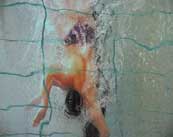VIRTUAL ACADEMY

The Bergen Academy of Art where Jez conducts his teaching and research is a tall yellow converted warehouse right on the waterfront. Jez's studio looks directly across the harbour at the cranes and barges. He gives us a few brief screenings from recent work like Across the Universe, a brooding video installation and Sixty Minutes, a DVD of sixty one-minute shorts.
He's busy with new Web projects as well like The Gold Standard which exist purely as compositions in cyberspace, exploiting the connectivity of the Web and the hyperlink as structural devices. The interface is the virtual space.
Back at the apartment that evening I point the camcorder at Jez, he pours two large single malts, and we attempt the art of the interview. My questions skid all over the place. Easier to slim down the inquisition and let the man talk.
What are the ideas interest you most right now?
I'm interested in some of the things Lev Manovich has written where he talks about "data base aesthetics" and the way cross-referencing functions in a data base programme as opposed to linear narrative. There's a particular aesthetic that's peculiar to digital media, computer games, interactive media and CD ROMS which breaks with the tradition of linear narrative that's inherent in cinema - although paradoxically he makes the point that new media use many of the devices of cinema like the frame and the shot. He takes an archeological approach.
How can we define new media?
One mistake made in the early 90s was that many people assumed there was an absolute rift between the analogue world and the digital world. But the way new media function owe a lot to previous forms. Some interesting research has been done on the evolution of the "vision machine" - it goes all the way back to Plato's Cave - but only picks up speed in the eighteenth and nineteenth centuries. There's a very self-conscious knowledge of that history. When you go to the cinema today and see a demo of THX sound, it's a reconstruction of the Lumiere Brothers film they use!
And quite a lot of early cinema has more in common with digital media that the mainstream of narrative cinema that took over. At the Transmedial Festival in Berlin a few months ago Peter Greenaway said that in over 100 years of cinema, cinema actually hadn't happened yet because the project of cinema had been abandoned in favour of " a long succession of literary texts." The challenge is to find a new language of cinema that's non linear and not simply an earlier literary form.
Burroughs wrote about "rubbing out the word" while McLuhan made cryptic remarks about "macroscopic gesticulation". Some contemporary digi-cultists in the Jaron Lanier mould imply that the human species might eventually abandon the verbal altogether...
I don't think so. Everything we do is language-related, we still construct everything mentally out of language. It's all relative to the verbal. A lot of the manic euphoria that greeted the development of the web has dissipated.
So what's the most striking immediate effect of the web ?
It's changed the way we think about music. Even though we have these debates which are perpetuated by the communications corporations about the piracy and the threat to the creative industries, it's actually not true! The amount of music that that's produced by the multi-nationals is a tiny percentage of what's being created globally - and possibly the least significant... Digital technology has allowed the creation of a whole other music industry. Which is where things are happening. For example, here in Norway, the Oslo-based Rune-Grammofon label - an ironic take on the Polydor/Deutsche Grammophon giant. It's doing very innovative music, has built up an international audience - a virtual community - through its web networking. The whole phenomenon is self-sustaining...
In the apartment entrance , there's a still from one of Jez's public commissions, a video installation for a swimming pool in Trondheim. Processed and edited submarine imagery of swimmers, including footage from a unique Norwegian sport, underwater rugby. He shot a lot of it himself athough he had to hire in a professional diver for one tricky sequence. Like so much of his recent work, it's a meditation on the phenomenology of vision, the mystery of light, the enigma of space.
I feel like a cultural amphibian, Creature from the Green Lagoon, crawling in the water-margins between the ocean of print and the rough beach of the new digital terrain. Maybe the metaphor should be reversed. I'm leaving the solid surfaces of the print culture, about to dissolve in the digital soup.
